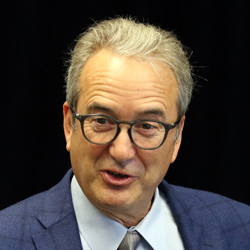
by Jonathan Gosling
Lead Faculty, The Forward Institute, UK
2 June 2020
Share:
There’s nothing unprecedented about COVID-19
Societies have often faced extremes of anxiety – there is nothing unprecedented about the sudden onset of life-threatening, systems-shaking shocks from invasion, colonization, famine, and plague. Societies also live with profoundly corrosive illnesses affecting huge numbers of people. More than 400,000 people die of malaria every year, mostly much-loved children under 5 years old. And societies have faced viruses that have no vaccine and no known treatment: HIV/Aids1 caused widespread panic and scapegoating, was met with denial and obfuscation by Presidents and populace alike, and now forms a grim and destructive backdrop to adapted ways of life in many countries such as Zimbabwe, where 22,000 people die of related illnesses every year.
What we know about leadership in anxious times
Facing these challenges, leaders tend to do “more of the same,” deepening their commitment to existing ways of organising. They act according to virtues that are admired and valued in that culture, even amidst the collapse of conditions in which these virtues are effective. To take a simple example, a culture may admire the knowledge and courage required for hunting dangerous animals, navigating large expanses of desert or ocean, and curing the kinds of physical and mental ailments that come with this way of life. These become irrelevant when foreigners arrive with rifles, GPS, and new germs. The basis of legitimate authority, once self-evident, shifts. Similarly, health systems that sustain a stable population in an industrial society institutionalise expertise and status in certain ways. Change tends to be slow, though competition, scale, and innovation are amongst the forces that shove and squeeze the status quo to adapt. On the whole societies find resilience to existential crises if they already have a diversity of organising modes and a mix of hierarchies, collectives, enterprising individuals and researchers who make suggestions from the side-lines.
Nonetheless, even in the most pluralistic and resilient societies, uncertainty about imminent infection and collapse prompts emotional responses. Some of these tend to open-heartedness and unselfishness, but others undermine the ability to trust others, tolerate differences, recognise new realities, reassess values, and change behaviours. Leadership can easily promote these less-helpful responses, as if the work that people require of their leaders is to deny the reality of the situation or to save them from it. With care and thoughtfulness, a third kind of leadership may emerge: leadership of adaptation. These three may be summarised as follows:
Leadership of denial can be intentional, but many unconscious acts demonstrate (and represent for followers) a deep-seated wish for it “not to be so.”
- Denying that there is a problem. President Trump did it upfront. The Chief Medical Officer of Scotland unconsciously acted-out denial when she drove miles to visit a holiday home on the same day that she announced the lock-down.
- Admit there is a problem but hijack the anger and grief and project it towards hatred and despair.2 Hence the proliferation of conspiracy theories usually associated with right-wing political movements mobilising typical leadership tactics of visionary simplification, charismatic aesthetics, adolescent machismo, and threatened or actual violence.
Despair is less tangibly led but is expressed in widespread depression. I imagine there are leaders of COVID-related despair (as there are of climate despair) but I’m not aware of research into it.
Leadership of salvation – Many people are motivated to take up leadership because they hope to rescue the situation (or at least their colleagues). The desire for salvation is manifest in the way we invest hope in instant vaccines, unlikely cures, track and trace technologies, and the miraculous effects of mindfulness and prayer.
Leadership of salvation is likely to have a religious or apocalyptic character because its energy derives from the intuition that there is another reality, less complex and dirty than this, just behind a veil of misunderstanding and ignorance. It can also make use of professional mystique – the scientists have it in hand, the algorithms will give us warning, the economists have a model. One tangible source of salvation from COVID-angst is the physical exercise guru Joe Wicks, followed on-line by millions in the UK, and I imagine there are equivalents in every country. The psychological wellness is undeniable: not all salvation is delusional (at least in the short term).
Leadership of adaptation is diverse and sometimes hardly recognisable as leadership. It may be found in counter-cultural experiments, in some protest and some policing, and often persistent and undemonstrative in the sustaining institutions of society (schools, churches, professions etc.). It helps us reconcile with the situation, measure the appreciation of risks, grieve when we suffer loss, weigh discretion when our options seem narrowed, and to choose pragmatic and courageous change.
In an influential paper on “deep adaptation” to the possibility of societal collapse Jem Bendel3 outlines “4 Rs,” which constitute a neat summary of the kinds of work to which leaders could contribute:
- Resilience, through stewardship of psychological, cultural, natural, and material resources.
- Relinquish habits and possessions that can no longer be sustained.
- Restore trust, confidence, shared values, and other social goods.
- Reconcile with those who we have fallen out with, in recognition of our interdependence and that life is much enhanced by amity and good will.
With this job description, leadership of adaptation is likely to be distributed through the community, much of it “close-up and personal.” But we can also look to political, media and business leaders to light the way in this regard. New Zealand premier Jacinda Ardern is a positive example; Boris Johnson sadly not so4.
Leadership of salvation is likely to have a religious or apocalyptic character because its energy derives from the intuition that there is another reality, less complex and dirty than this, just behind a veil of misunderstanding and ignorance.
In practice, the leadership of denial, salvation, and adaptation are seldom so clearly separated. The urge to deny a problem exists alongside a wish to be saved from it. Even leaders committed to adaptation find themselves called on to offer reassurances and hope of salvation. So what we might call “the politics of adaptation” involves a complex of conscious and unconscious dynamics, often contradictory – akin to thoughts such as “I know death is unavoidable and I want to be saved from it.”
But sometimes it really is that clear-cut. There are prominent leaders today who unashamedly act out the impulses of denial and the fantasy of salvation with no perceptible capacity to lead the work of adaptation. It is incumbent on us in the International Leadership Association to call it out, and also to ensure our leadership education and development is attuned to the work of adaptation. This crisis is just the beginning – we should prepare!
1Hargreaves, J. and Dacey, C. (2020) Three lessons for the COVID-19 response from pandemic HIV The Lancet HIV https://doi.org/10.1016/ S2352-3018(20)30110-7
2Eisenstein, C. (2020) The Coronation. https://charleseisenstein.org/essays/the-coronation/
3Bendel, J. (2018) Deep Adaptation: A map for navigating the climate tragedy Occasional Paper 2, Initiative for Leadership and Sustainability, University of Cumbria. https://iflas.blogspot.com/2018/07/new-paper-on-deep-adaptation-to-climate.html
4For an analysis of his failings in this regard see Tomkins, L (2020) ‘Where is Boris Johnson? When and why it matters that leaders show up in a crisis’ in Leadership https://doi.org/10.1177/1742715020919657

Jonathan Gosling is interested in active citizenship and is lead faculty of The Forward Institute promoting a movement for responsible leadership. He is Emeritus Professor of Leadership at Exeter University and runs a consultancy for world thinkers called Pelumbra.com. He hosts writing retreats on the beautiful and wild island of Lambay, off the coast of Ireland. Jonathan was Chair of ILA’s 2011 Annual Conference in London.

